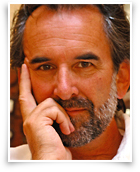
Richard Harvey
connecting psychotherapy and spiritual growth for human awakening
Mental Illness and Spiritual Enlightenment
Purnima Pandey, Associate Editor of Life Positive Magazine (Hindi) asks Psychotherapist, Spiritual Teacher, and Author RICHARD HARVEY questions about mental illness and spiritual enlightenment.
What is the difference between the experiences of mental illness and spiritual enlightenment?
The symptoms can be quite similar. The experience of mental illness alone may be many and varied as may be the experience of spiritual enlightenment. But here I would distinguish this word experience. Spiritual enlightenment is not an experience. Therefore what we are talking about when we compare and contrast mental disorder with spiritual “experience” is the preparatory stages that precede enlightenment, since only this is, truly speaking, an experience.
One of the differences I have noticed is that the individual experiencing the mental illness or spiritual “experience” makes a choice. He or she has to choose and there's an authentic fork in the road—one way is marked insanity and the other enlightenment. Enlightenment is the ultimate maturity and we know that through the stages of maturity in a human life our resistance to going past our present circumstance is immense, because we would rather be reliant and dependent on others than be truly self-responsible.
There are degrees of mental illness. The point at which we must draw a line with a mentally ill individual is this: does he or she have their core, their essence intact? Or is it damaged to such a degree that it is truly irretrievable. This is my boundary for distinguishing the potential for spiritual awakening or enlightening "experience" from mental illness.
How can a person differentiate on his own?
Through referring to his inner wisdom, his inner guru. Most of us are unable to do this on our own, so we should wisely seek an outer embodiment of wisdom, a teacher, a guide. The teacher will know and the teacher will guide and negotiate your journey through the veils of mind and the resistance of the ego-self.
Is a spiritual awakening almost always precipitated by a severe emotional or spiritual crisis?
I don't think it is. It seems that way sometimes. But I think if you look around, read a little bit through different traditions and research somewhat, you'll see that it may be quite easy, tranquil, simple. Sometimes the ordeal and the trauma have been faced ahead of time, sometimes the pain has been processed and there is a very easy transition. I would liken it to childbirth and the natal experience. Some children are born amid mayhem and torment, others merely slip through into this world.
What signs of craziness are signs of a passage into a higher consciousness?
Fearlessness, lack of torment, a free spirit, lack of regard for conformist thought and behavior, courage, devotion, surrender.
Is the spirituality of mad people a symptom or a potential source of inspiration? Or both?
Well, that's what we're discussing here, isn't it? If by “mad” we mean intentionally not conforming to the world, then of course that's inspiring. If by “mad” we mean with a center so damaged that the human being is beyond repair then, no, there's nothing inspiring or spiritual about that at all.
Whom to approach first to understand genuine spiritual emergence and learn to differentiate them from cases of psychosis?
Someone who knows. A gifted psychotherapist perhaps, an aware spiritual teacher who has empathy with the psychological condition of his or her devotees and doesn't merely brush aside their psychological states, an intelligent heartfelt guide who is empathetic, sensitive, and wise. Truthfully it seems hard to find someone these days who knows the difference between spiritual initiation and mental disorder. Such a lot of complementary-alternative medicine practitioners are not overly experienced, gifted, or deeply wise. Counselors and psychotherapists too may find this distintion beyond their capabilities and training. Gurus often don't entertain psychological failings and frailties.
If spirituality can help people deal with life-changing processes, does that mean that it can help the insane to get treated without medicine?
Really depends what we mean by “insane.” If you can make the person suffering from symptoms of mental disorder aware of their choice to treat themselves in a conformist way as insane, then they may be able to avoid medication and take the spiritual fork in the road I mentioned earlier. As for spirituality helping people with life changes, strictly speaking I would say no. Spirituality pertains to the timeless, the numinous, the eternal source of Divinity, while life changes are transient, changing, impermanent, relating to the relative, temporal world.
Can we transform psychotic experiences in spiritual emergence with the help of awakening methods?
Only the mind makes you mad. Psychosis involves an over intensity of thinking mind that in effect is the obsession with the ego-self. In psychosis the eruptions caused by this over intensity create psychosis. Spiritual emergence involves a complete lack of thinking in favor of what truly is. Certainly if you can encourage a person suffering psychotic episodes to release their mental obsession you might provoke healing in time.
(You can learn more about Richard Harvey on this site and on Sacred Attention Therapy. Also view free talks and interviews on the Sacred Attention Therapy YouTube Channel.)
Share this article
This article was published on this site in 2015.